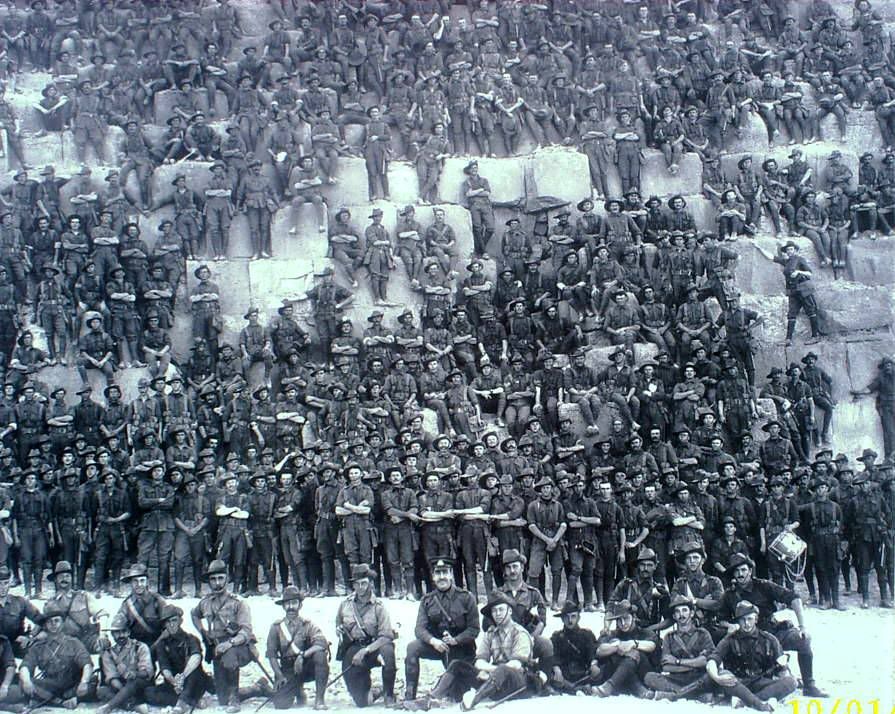 In Australia, we have just marked ANZAC Day, which is our version of
Memorial Day. We also mark Armistice Day in November, but ANZAC Day is our big
one. It's a public holiday with dawn services, marches featuring veterans,
their relatives and descendants and current serving men and women in major
cities, special church services, and much drinking as the day goes on.
In Australia, we have just marked ANZAC Day, which is our version of
Memorial Day. We also mark Armistice Day in November, but ANZAC Day is our big
one. It's a public holiday with dawn services, marches featuring veterans,
their relatives and descendants and current serving men and women in major
cities, special church services, and much drinking as the day goes on.
It is the anniversary of an attack on Turkey on the 25th of April 1915 which ended as a tremendous
failure. ANZACs (Australian and New Zealand Army Corps) as well as troops from
Great Britain, Ireland, France, India and Canada managed to get ashore in the
Dardanelles, but fierce defence from the Turkish troops kept them pinned on the
shore, with the furtherest point achieved at Chunuk Bair by New Zealand
soldiers. After eight months of bloody fighting all Allied troops withdrew.
Although British troops lost far more men than the ANZACs, for
Australia, then just a little over fourteen years old, the campaign was of
a far greater significance. For the first time since we became a nation, we sent
troops overseas and they acquitted themselves not only well but heroically. The
reputation of the Australian army was made in that campaign, with praise coming
from British commanders as well as Turkish opponents.
Looked at this light, it's no mystery why ANZAC Day so quickly
became such an important day. It was marked the very next year and by 1923 had
became a holiday. In the 60s and 70s, with the anti-war protests of Vietnam,
and WWI veterans becoming a dying breed, the march and the day was in danger of
becoming obsolete. Since the 90s it has enjoyed a resurgence in popularity, and
is recognised as a day of solemnity, thanking those that died in the service of
their country, and recognising all the victims of war, be they in uniform, at
home, or even belonging to the enemy. Still doesn't mean that old soldiers
don't like a beer when they get together.
 So being popular, and involving war, the more progressive type has to find fault with it. The ANZAC myth has produced the ANZAC myth myth, which
tells us just about every thing you know about ANZAC campaign and the day is
wrong, ill-informed, propaganda and glorifying war. Po-faced pundits on
television, having neglected to study history, ask in very serious voices
provocative questions that only they dare to ask, not realising, had they
studied history, those questions have been asked and answered before. History
is another subject people don't feel the need to study to pronounce on it.
So being popular, and involving war, the more progressive type has to find fault with it. The ANZAC myth has produced the ANZAC myth myth, which
tells us just about every thing you know about ANZAC campaign and the day is
wrong, ill-informed, propaganda and glorifying war. Po-faced pundits on
television, having neglected to study history, ask in very serious voices
provocative questions that only they dare to ask, not realising, had they
studied history, those questions have been asked and answered before. History
is another subject people don't feel the need to study to pronounce on it.
The reputation of the ANZAC soldier has been exaggerated, they say,
blaming C E W Bean, the official war historian. But Bean's work is impeccably
documented and the praise that came from ally and enemy real enough. What about
the soldiers that ran, that turned away from the enemy? They are in there too, and in the large print. But the vast majority of soldiers fought well, so if the
emphasis of our memorial is on them, we are only going with numbers. Maybe they
did join for a lark, to get away from small towns and be with their friends.
But when they were confronted with the reality of war, they met the challenge.
Like in many other areas of life, there seems to be an idea that
focussing on the negative, the worst of people, the darkness is somehow more
courageous, more real, than focussing on the positive. But we're kidding
ourselves. There is a thing called the Parochialism of the Present, the belief that what
is now is the best that has been. The ANZACs challenge that idea to say the least. They provide an
example of bravery and self-sacrifice that we, in our comfortable, rich, well-protected
lives have never been called on to match. I pray God we never will be. But
there is that thought, in our darker hours, that maybe we couldn't. And it's
much easier to denigrate the example than to think that we won't match it. In
the end, if all you know of Gallipoli and the Dardanelles is the ANZAC legend,
where troops were ashore in an ill-
conceived plan badly carried out, fought
bravely, suffered, earned the respect of their allies and their enemies before
evacuating in a well-planned, well-performed operation, you've actually got a
pretty good idea of what happened.
ANZAC Day marks the day when Australia went from a political idea
constructed from votes and legislation to a nation on the world stage, and we
use this day to remember all those who suffered in war then and since. If you
want to pooh-pooh this day, go ahead. We live in a free country.
PS: This entry was inspired in part by John Hirst's Sense and nonsense in Australian history, a collection of his essays from a career studying Australian history. It's worth checking out!

No comments:
Post a Comment